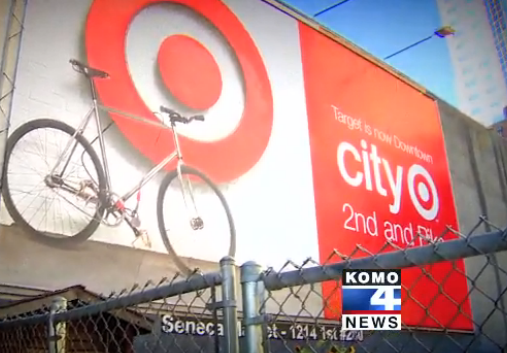Advertisers Set Up Bogus Storefronts To Skirt Seattle Billboards Laws Image courtesy of This is not a Target billboard.
Look at the screengrab above. You can clearly see the Target billboard on the side of the building. But what you can barely see through the fence is the name of a “market” at the bottom of the sign.
Seattle’s KOMO-TV went to this market and found it’s just a name on a door in a “urine-soaked” back alley. It’s also only open a few hours a week, and the guy inside just sells Target gift cards.
But that’s not his only gig. The guy moves from building to building during the week, some of which house actual stores, but some of which are closed offices with stacks of abandoned furniture. One “store” is actually the locked lobby of an apartment building, where someone sits inside for a few hours a week in order to justify the huge sign on the outside.
Though we often include the video for stories like this just in case someone wants to watch it, we are recommending you watch the following clip from KOMO News, if only to see the same dude in the same Sonics jersey popping up in location after location selling gift cards for everything from Apple to Iceland Air:
These ads can bring in upwards of $25,000 to the landlords of these buildings, so they don’t care that there is a guy selling gift cards to absolutely no one for a few hours a week.
The city isn’t thrilled about it and says the advertisers are pushing the law to the limit, and perhaps beyond. But Seattle also only has one sign inspector and the limited penalty it could get from the ad agency is significantly less than what the agency receives from the advertisers. So even if the agency lost in court, it would still make a profit.
Seattle City Council President Sally Clark tells KOMO she hopes to introduce a new law next year to close this loophole. Though we imagine that the landlords who are making money from these signs might have something to say about that.
Want more consumer news? Visit our parent organization, Consumer Reports, for the latest on scams, recalls, and other consumer issues.


